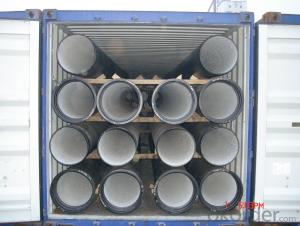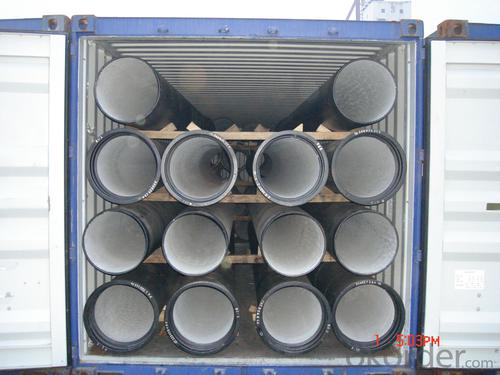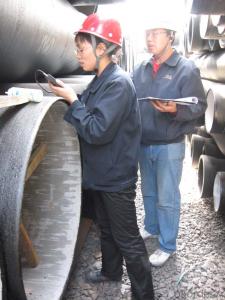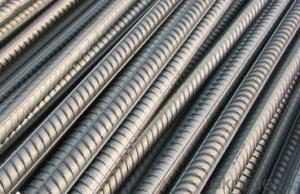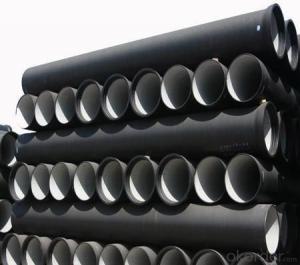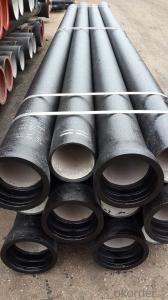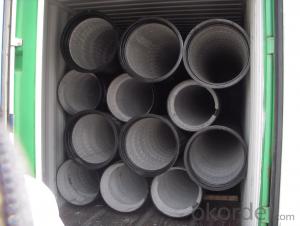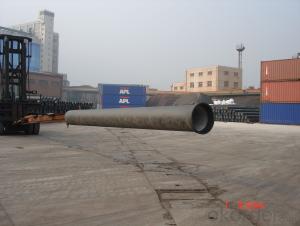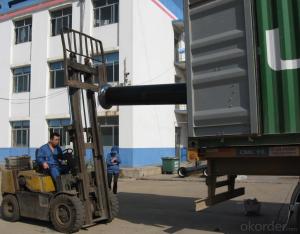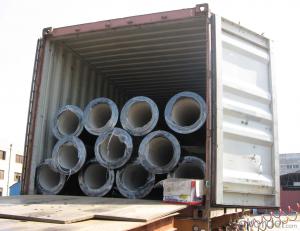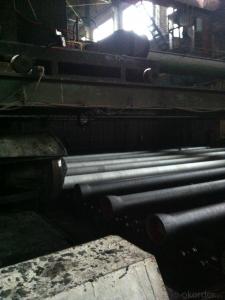DUCTILE IRON PIPE AND PIPE FITTINGS C CLASS DN700
- Loading Port:
- Tianjin
- Payment Terms:
- TT OR LC
- Min Order Qty:
- 23 pc
- Supply Capability:
- 3000 pc/month
OKorder Service Pledge
OKorder Financial Service
You Might Also Like
· Material : Ductile Cast Iron
· Size Range : DN 80mm to DN 2000mm
· Unit Effective Length : 6m or 5.7m
· Manufacture Standard: ISO 2531:1998/ EN 545:2006/EN 598:2007
· Annual capacity : 200,000 tons
· Coating Exterior: Zinc 130g/m2 according to ISO 8179-1 and bitumen coating 70 microns.
· Cement Interior: Portland Cement/ High Alumina Cement/ Sulphate Resisting Cement Lining according to ISO 4179
· Special requirements on external coating and internal lining can be applied
· We also provide accessories such as SBR/EPDM rubber gaskets, lubricant paste, pipe caps, PE sleeves, etc.
Additional Parts:
Each pipe is strictly inspected according to related standard to ensure permanently high performance.
Easy Installation at site and service free for life
Long Service Lifespan
Quotation will arrive you within 24hours once we get your inquiry.
We guarantee offering you a competitive price.
A copy of original inspection reports of pipes will be offered after shipment.
Photos of loading process will be sent to the customer after shipment effect.
We will follow-up the delivery progress after shipment effect and update to the customer on weekly basis.
- Q: Can ductile iron pipe be used for trenchless installation methods?
- Yes, ductile iron pipe can be used for trenchless installation methods. Trenchless installation methods, such as pipe bursting or horizontal directional drilling, are suitable for various pipe materials including ductile iron. Ductile iron pipes are known for their strength, durability, and flexibility, making them suitable for trenchless methods where the pipe needs to be installed without an open trench.
- Q: Can ductile iron pipe be used for high-pressure gas systems?
- Yes, ductile iron pipe can be used for high-pressure gas systems. Ductile iron pipes have excellent strength and durability, making them suitable for handling high-pressure gas applications. Additionally, their corrosion resistance properties make them an ideal choice for gas transmission systems.
- Q: Can ductile iron pipes be used in areas with high levels of organic matter in soil?
- Yes, ductile iron pipes can be used in areas with high levels of organic matter in soil. Ductile iron pipes have excellent corrosion resistance, making them suitable for various soil conditions, including those with high levels of organic matter. They are resistant to chemical attacks and offer long-term durability, making them a reliable choice for such environments.
- Q: Can ductile iron pipes be installed outdoors?
- Ductile iron pipes can be installed outdoors.
- Q: Can ductile iron pipes be used for large-scale irrigation systems?
- Yes, ductile iron pipes can be used for large-scale irrigation systems. Ductile iron pipes are known for their strength, durability, and resistance to corrosion, making them suitable for various applications including irrigation. These pipes are able to withstand high pressure and can handle the demands of large-scale irrigation systems. Additionally, ductile iron pipes have a long lifespan, reducing the need for frequent replacements and maintenance. They are also cost-effective compared to other materials used in irrigation systems. Therefore, ductile iron pipes are a suitable choice for large-scale irrigation systems due to their strength, durability, corrosion resistance, and cost-effectiveness.
- Q: Ductile iron pipe is how many years warranty
- In the ferrite and pearlite matrix on the distribution of a certain number of spheroidal graphite, according to the nominal diameter and the elongation of different microstructure of ferrite and pearlite in different proportions of small caliber pearlite percentage is generally not more than 20%, large diameter of the general control in about 25%.
- Q: The design uses water supply ductile iron pipe, PE corrosion protection pipe, HDPE pipe, please ask that good? What's the price of the two?
- Now the mainstream is PE pipe, ductile iron pipe has been going out.
- Q: Are ductile iron pipes suitable for bridge crossings?
- Yes, ductile iron pipes are suitable for bridge crossings. Ductile iron pipes are known for their high strength and durability, making them a reliable choice for various applications, including bridge crossings. These pipes can withstand heavy loads and are resistant to corrosion, which is especially important in bridge crossings where they may be exposed to harsh environmental conditions. Additionally, ductile iron pipes have the ability to flex and withstand ground movement, making them ideal for bridge crossings where the ground may shift or settle over time. Overall, ductile iron pipes offer the necessary characteristics to ensure the safe and efficient transportation of fluids or materials across bridges.
- Q: Are ductile iron pipes suitable for installation in areas with high groundwater contamination and soil erosion?
- Areas with high groundwater contamination and soil erosion are typically well-suited for the installation of ductile iron pipes. This is due to the fact that ductile iron pipes are renowned for their durability, strength, and corrosion resistance. They exhibit exceptional resistance to acidic and alkaline soils, rendering them appropriate for regions with elevated levels of groundwater contamination. Moreover, the robust construction of ductile iron pipes grants them a formidable resistance to soil erosion. They are engineered to endure a range of external forces, including the pressure exerted by the surrounding soil and the potential movement resulting from erosion. Consequently, they are a dependable choice for installation in areas prone to soil erosion. Nonetheless, it is vital to acknowledge that while ductile iron pipes can withstand high levels of groundwater contamination and soil erosion, the implementation of proper installation techniques and maintenance practices is crucial to ensure their longevity and optimal performance. Regular inspections, meticulous backfilling, and the application of suitable protective coatings should be employed to maximize the lifespan of the pipes. To sum up, ductile iron pipes are generally well-suited for installation in areas characterized by high groundwater contamination and soil erosion. Their durability, strength, resistance to corrosion, and high resistance to soil erosion establish them as a reliable choice for such environments. However, adhering to proper installation and maintenance practices is imperative to guarantee their longevity and optimal performance.
- Q: Can ductile iron pipes be used for wastewater treatment plants?
- Yes, ductile iron pipes can be used for wastewater treatment plants. Ductile iron pipes are known for their strength and durability, making them suitable for handling the harsh and corrosive environment of wastewater treatment plants. These pipes can withstand high pressures and are resistant to corrosion, which is essential in handling wastewater and various chemicals involved in the treatment process. Ductile iron pipes also have the advantage of being easy to install and maintain, with a long service life. Therefore, they are commonly used in wastewater treatment plants for transporting and distributing wastewater throughout the facility.
Send your message to us
DUCTILE IRON PIPE AND PIPE FITTINGS C CLASS DN700
- Loading Port:
- Tianjin
- Payment Terms:
- TT OR LC
- Min Order Qty:
- 23 pc
- Supply Capability:
- 3000 pc/month
OKorder Service Pledge
OKorder Financial Service
Similar products
Hot products
Hot Searches
Related keywords
